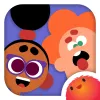Take a look inside 5 images
Hopster Saturday Club: Empathy
Pros: A wide range of emotions introduces kids to more than just the basics.
Cons: No option to create user profiles means that kids must each have their own device to use the diary properly.
Bottom Line: This could be a fun introduction to talking about a variety of emotions and how to recognize them in others.
Teachers can use Hopster Saturday Club: Empathy as a launching pad for a unit on emotional expression, though they'll want to expand on what kids do in the app. For instance, as kids collect and identify each new emotion in the matching game, talk about when kids have experienced that emotion. Discuss what other situations might make someone feel that way. Then, teachers can introduce strategies for regulating strong emotions like anger or fear, and they can ask students how they work with big feelings. Kids can also role-play to delve in deeper and practice the strategies. If teachers use the diary function, each student will need their own device. Collect emotions for one week and then listen back to how their feelings changed (or didn't) over the course of the week.
In Hopster Saturday Club: Empathy's three activities, kids practice identifying or expressing emotions. In a game of matching, kids must choose which of four characters is expressing feelings that match a scenario such as "Can you tell who's trying hard to pay attention?" In drag and drop expressions, kids mix and match eyes, mouths, and accessories to create faces and showcase different emotions. And a daily diary asks kids to choose from 15 faces, each expressing a different emotion, to describe how they feel that day. Once they choose an emotion, they can make a short audio recording describing why they chose that feeling. To do this, teachers need to be present to enter their year of birth and allow access to the device's microphone. Hopster Saturday Club: Empathy features characters from Saturday Club, an original series from the digital TV network, Hopster. Kids don't need to have any familiarity with the TV series, however, to be able to use the app.
Though emotions are introduced superficially, there's a good enough variety of emotions and activity types to make Hopster Saturday Club: Empathy an interesting option for starting a discussion about feelings. Silly and extremely emotional characters showcase a relatively well-rounded collection of emotions, from happy and angry to focused, excited, and grumpy. Each of the 15 included emotions is represented by four different characters, which may help kids recognize how emotional expressions have similar characteristics across different people. However, it isn't always easy to confidently identify the emotions with these simplistic cartoon drawings. The matching game is nice because kids work not only on recognizing and naming emotions, but also on exploring the situations in which someone would feel that emotion. Of course, creating a strong connection to off-screen scenarios and introducing strategies for self-regulation are up to the teacher.
The diary is an easy way for kids to express and track their own emotions, though their options are limited to just the 15 included choices. The most simplistic -- and disappointing -- game is the one in which kids create faces. It would be nice to see kids have more control over the possible expressions and to label and document what they've created, for instance. Hopster Saturday Club: Empathy could stand on its own, but it has most potential as a learning resource when it's used as a spark for conversations about emotions.














